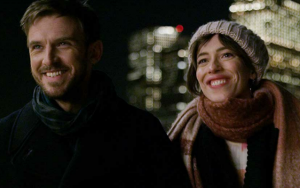Metro: Permission explores how far you can stray in an open relationship.
 By Richard Crouse – Metro Canada
By Richard Crouse – Metro Canada
In its first hour, the new film Permission looks and feels a lot like a traditional romantic comedy — but this is a trick, says actress Rebecca Hall.
“When we first started out making this (director Brian Crano) said, ‘I want this to look like a classic rom-com from the ’90s. Lots of backdrops from Manhattan. Lots of completely gorgeous-looking apartments that, inexplicably, these people are living in. Everyone is beautiful. Everything is beautiful,” explains Hall.
And just when you think you’re on cosy ground, “the rug is pulled out from under you. You feel gut-punched.”
In the film, Will, played by Downton Abbey’s Dan Stevens, and Anna (Hall) have been sweethearts since high school. Now, on the cusp of her 30th birthday he’s about to pop the question. First though she drunkenly proposes they sleep around a bit. Not break up, but get some life experience before they settle down. At first they encourage one another in a bit of harmless fun but as their polyamorous relationships start to deepen, uncomfortable realities are revealed.
“Over the years we’ve all had conversations about relationships and where they were heading,” Hall says. “Brian noticed a general trend that happened somewhere around the ages of 27 to 30-something, where people who had been in shockingly monogamous, stable relationships either got married or broke up. This was something he was interested in because so many of his friends were children of divorce or had complex attitudes toward monogamy. Some were fundamentally monogamous while others were exploring other options.”
Permission’s final third contains the film’s most essential truths. In a dramatic shift in tone from the first hour, the harsh realisms of this arrangement appear.
“The thing we were interested in weren’t the moral rights or wrongs, if there are any, of having an open relationship,” she says. “It was more about these two people who are stuck, who have not allowed each other growth because they have been together for so long and have not had the level of communication in the relationship that is necessary. The film is really about giving ourselves permission to question a relationship that is basically good. It sounds like a nothing statement but no matter how sophisticated and evolved and progressive we have all become there is still this strange pressure to do the right thing. If the relationship is good you stay in it because if you leave it you might be mean or a failure.”
The film takes a thoughtful and mature approach to its story, asking: How far can you stray, even with permission?
“Brian and I used to play a little game,” Hall says, “where we would try and think of films and stories where women have sexual agency but aren’t kooky, crazy people who end up being psychopaths or pixie dream girl stereotypes. It was difficult to come up with. The construction of Anna was really someone who is working out what that means. She is going to discover what sexual agency means for her. She is going to own it and be empowered by it. I think that is a really important message to put out there right now.”
